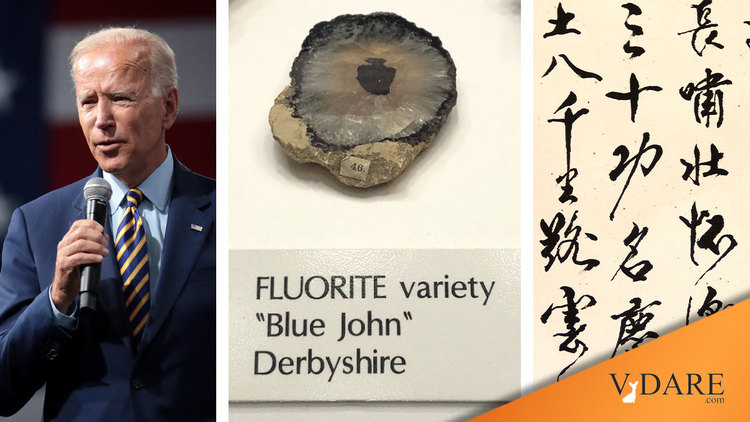


06/07/2021
Just a few.
• May brainteaser. My worked solution here. Thanks to the reader who sent me this neat little example of classical geometry.
• Biden moments. In my June 4th podcast, at 41:07 here, I committed the following:
A bulletin from our federal Department of Justice Office of Public Affairs, dated January 2nd …
I meant June 2nd. Sorry about that. Don’t say I didn’t warn you, though. I did, at 01:18 on the same link.
Much less excusable was my having Shakespeare’s Henry the Fifth urging his troops to "Cry God for Harry, England, and Saint George!" at the Battle of Agincourt, rather than Harfleur. I felt sufficiently bad about that to put a correction in the transcript (i.e. of the May 28th podcast).
• Derb stoned. A sharp-eyed correspondent noticed this specimen in the geological section of Pittsburgh’s Carnegie Museum.

Heh.
• Including "and" and "the. In my May 28th podcast I said this:
You should approach any official ChiCom source with the assumption you are being lied to. Every word the ChiComs say is a lie.
(I was going to append the traditional quip: "including 'and' and 'the'"; but the word for "and" in Chinese is hardly used, and the language doesn’t have a word for "the" at all.)
That left a listener perplexed. He allowed that a language can get along without a "the," and many languages do — Latin, most obviously. Is it really the case, though, that "the word for 'and' in Chinese is hardly used"?
Well, I’m very far from fluent in Chinese, but that’s how it seems to me. The actual word for "and" in Chinese is 与, pronounced yŭ, but it doesn’t show up much, certainly nothing like as much as "and" does in English.
As a quick check, I went to the last page I bookmarked in any plain-text Chinese book (actually page 546 of this book). The page contains 514 characters of printed Chinese. Not one of them is 与. By way of comparison, I checked with the last full page of a plain-text English-language book I read (page 224 of Ann Patchett’s novel Bel Canto): 391 words, twelve of them "and."
I associate 与 with the Chinese translations of famous novel titles: Pride and Prejudice (傲慢 与 偏见, aòmàn yŭ piānjiàn), War and Peace (战争 与 和平, zhànzhēng yŭ hépíng), Crime and Punishment (罪 与 罚, zùi yŭ fá), The Red and the Black (红 与 黑, hóng yŭ hēi), and so on. Aside from that, I don’t see it used a lot.
That "and so on" I just wrote, for example, is done in Chinese by 等等, just a double-up of 等 (děng), a marker for the plural. "A, B, C, and D" in Chinese is "A, B, C, D" — why do we bother with that "and"?
"You and I" is likewise often just 你, 我 (nĭ, wŏ), "You, me." If a conjunction is used, it’s most likely 和 (hé), "with," to make 你 和 我, sometimes further clarified as 你 和 我 一块儿 (nĭ hé wŏ yīkuàir), "you with me together" or 你 和 我 一齐 (nĭ hé wŏ yīqí), "you with me simultaneously."